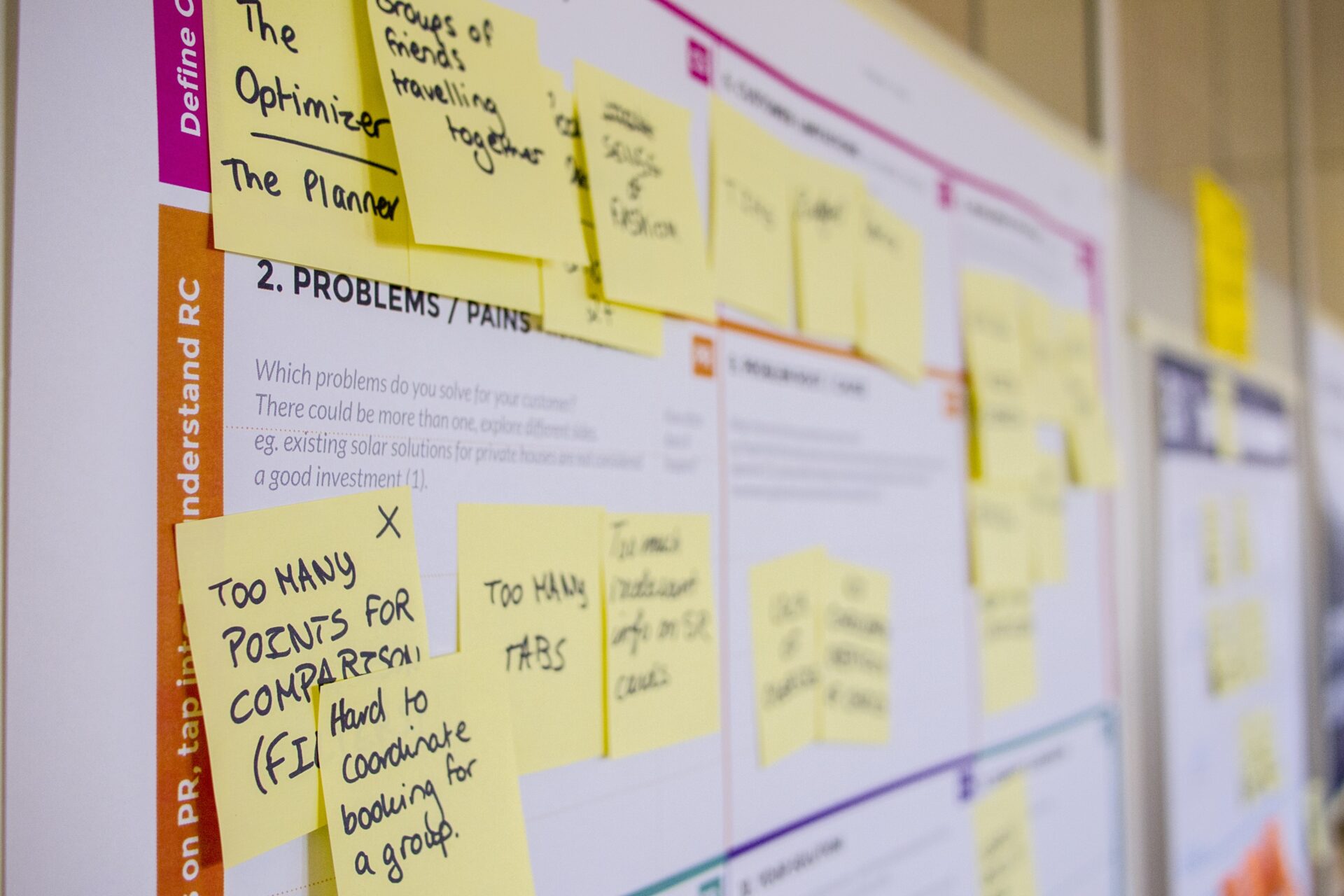Horasis USA Meeting 2022: Shaping America’s Role in a Post-Pandemic World
This meeting was the second focusing on the US, following the success of the first meeting in 2021: it will discuss the future of the United States of America and its influence on the rest of the globe. It is an important year for the US as it holds the first mid-term elections for the Biden administration. The 2022 year began with several major issues requiring addressing: the COVID pandemic had been gripping all nations for 30 months and while many nations were managing to administer at least one vaccination, no cure had been found at the time. The effects of COVID are widespread throughout the US and across global economies affecting production, logistics and consumption of all resources; it has diminished the global GDP and raised many economic issues. And, as well as the COVID-related logistics issues, trade disputes and embargoes, mainly between the US and China but not exclusively, have spread across many sectors of manufacturing because of restrictions on electronics manufactured in China leading to a consequential lack of parts creating backlogs across the world.
But of far greater consequence was, and is, the Russian invasion of the Ukraine which began on February 24th, 2022 despite weeks of assurances by President Vladimir Putin that Russian troops massed on Ukraine’s borders were not for an invasion, only for standard maneuvers. As the invasion expanded, Ukrainians took to arms and fought valiantly against the odds wining on several occasions against a far stronger invading army. Behind the scenes, across the globe, the invasion was denounced – a United Nations Security Council on Friday 26th February held a resolution denouncing Russia’s invasion of Ukraine while China, India, and the United Arab Emirates abstained from the vote: the remaining 11 council members voted in favour, allowing the draft resolution to be taken up by the 193-member UN General Assembly. “You can veto this resolution but you cannot veto our voices,” exclaimed the U.S. Ambassador to the United Nations Linda Thomas Greenfield at her Russian counterpart. The US moved to fully support NATO and major sanctions have been announced.
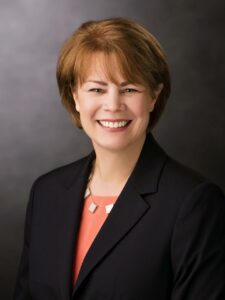
Sharon Eubank, President, LDS Charities, USA
A panel on Leadership in an Era of Humanitarian Crisis: The Role of Communities of Faith notes how the church and faith can aid Ukraine and others without discrimination. Although the pandemic and other events of global impact seem beyond control they ultimately affect people locally. People become disillusioned, and without hope fall prey to despair and populism. Religion can help us develop inspirational progress across economic, political and spiritual betterment, in the US and globally, as stated by Sharon Eubank, President, LDS Charities, USA said of her Church, “We have members in all the countries affected… they’re all receiving enormous numbers of refugees and are generously giving all the help that they can. And we have members in Ukraine who are facing impossible choices in the destruction of their beautiful country.”
The meeting held a Special Plenary direct from Ukraine, noting for the first time in 77 years a European nation has been invaded. The world has condemned the action of Russia’s President Putin while Ukraine called upon the world to support its peoples in whatever way you can: democracy and decency demands this. All speakers asked for a no-fly zone over Ukraine to halt indiscriminate Russian bombing of non-military places.
A special plenary on the war in Ukraine was chaired by Henry Shterenberg, Ambassador of Horasis to Ukraine, Ukraine who hopes that the war will be over soon – so think how you can be a strategic partner with Ukraine to rebuild it. He emphasized he left Ukraine at 18 with his parents, became American citizen and returned a while ago to help Ukraine. He promises to concentrate now to rebuild Ukraine after the war – continuing what he was doing prior to the war– building the ‘Ukrainian Dream’ based on Smart and Bio-sciences.

Olena Khomenko, Members of Parliament, Member of the Committee on Foreign Policy and Inter-Parliamentary Cooperation, Ukraine
Dmytro Kysylevsky, Chair of Economics Committee was first to speak and mentioned that nationalization of Russian property was underway and that many businesses were cutting ties with Russia. Ukraine is presently acting as a barrier between civilization and de-humanization and all of this aggression/ barbarism is really of global concern – well beyond only Ukraine. Russia must be seen as a terrorist state. Olena Khomenko, Member of Parliament, Member of the Committee on Foreign Policy and Inter-Parliamentary Cooperation, Ukraine. Stated we would like all international businesses to support sanctions to follow the lead of the US. We might expect Russian inflation to top 30-40% , and national wealth to fall rapidly. She appealed to the Gulf, Asian and nations other than EU and US to step up action and condemn of Russia.
Mariia Mezentseva, Member of Parliament, Deputy Chair, Committee on Ukraine’s Integration into the European Union, Ukraine – noted cluster bombs have been used randomly killing many, including children. Promises of aircraft delivery have not occurred yet to let Ukrainian pilots protect the airspace. And there are no green corridor routes declared on land to safely evacuate refugees. Vadym Halaichuk, Member of Parliament, First Deputy Chair of the Committee on Ukraine’s Integration into the European Union, Ukraine said Ukraine has been ready to join EU for past 20 years, and the nation wishes to join NATO (an application was re-issued recently by the President) but EU and NATO members are slow. He asks all Europeans to ask their governments to allow Ukraine to join.
Yevheniia Kravchuk, Member of Parliament, Deputy Chair, Committee on Humanitarian and Information Policy, Ukraine. There is a catastrophe upon the people in shelters without food, electricity… they need medication and food: Russian troops are forbidding aid transport in places. And telecommunications are broken in many places. She like others asked for a no-fly zone, and for Red Cross to help tend also for injured Russians, even if Russians don’t stop attacking civilians – they already know about 24 children have been killed. Lesia Vasylenko, MP, Chair of the Sub-Committee of Climate Change of the Committee of Environmental Policy, Ukraine. She is a member of the opposition in parliament, but that does not matter – we are all together. Russia is attacking our infrastructure – 52% of our electricity is generated by nuclear energy and attacks risk massive problems leading to potential global disaster. This foments some of the ‘panic’ expressed by Ukrainians to the world as they fear the global nuclear disaster that could unfold.
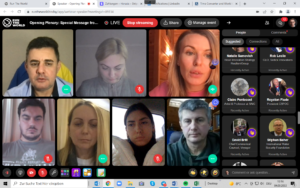
Special Message from Ukraine – with Ukrainian Parliamentarians
A documentary program from ABC an Australian news channel, was aired. They visited the separatist Donetsk region talking with Ukrainians and Russians. Some of the latter were adamant that Ukraine was being run by Nazis, following their acceptance of Russian media stories, and by their fear of the Azov Regiment whom they said were composed of white supremacists. Indeed, they were originally far-right, but are now incorporated into the Ukrainian army. The documentary showed that feelings were entrenched and would be difficult to modify: and the Russian invasion supports the beliefs of some.
These images and speeches through the special plenary on Ukraine were powerful reminders that war is a stupidity, and diplomacy saves lives. But we have what we have. Sanctions and direct actions are being applied and people die, devastating families of all sides.
A vast number of smaller but important sanctions and decisions have been made – such as banning Russia from most external sports and people-oriented gatherings; others suggested the decoupling of stock-holdings even at a large cost – like oil company Shell exiting its joint ventures with Russia’s state-owned energy giant Gazprom and related entities, including a 27.5% stake in a key liquefied natural gas project as well as 50% stakes in two projects that are developing oil fields in Siberia – but oil and gas must continue to flow to maintain essential energy supplies even while pivoting to other sources.
An economic question arises as gas prices in Europe are rising: they are in fact, not substitutable – so households are going to reduce their consumption of other items over which they have more control – the spectre of stagnation arises.
There is a global movement to de-invest in Russian ventures over and beyond the sanctioning of all connections with Russia. Russian entities now have problems in debt servicing. It is suggested that Russia might suffer its first ever default on a sovereign hard currency debt due to the sanctioning of Russian government entities by the United States, and counter-measures within Russia restricting foreign payments, and the disruptions of payment chains including SWIFT: all present high hurdles to make a bond payment abroad. Further, on February 25th European Central Bank President Christine Lagarde called on EU lawmakers to approve a regulatory framework on crypto, hinting at the potential to prevent Russia from getting around sanctions. In the United States, there has been a similar regulatory push from lawmakers.
The unintended consequences of these movements are huge. Immediately oil and gas trading prices have ramped up as big energy majors rush to unravel contracts. Shippers need fuel, as do all logistics suppliers, as do the original equipment manufacturers and farmers globally – these spread into questions of future food stability. Global FDI is falling says the IMF and perhaps best seen as China has forecast 5.5%, its lowest rate since 1991. And the UNHCR (the UN refugee agency) estimates, at the time of this meeting, about 1.2 million people have fled Ukraine.
Market observers note the reverse effect of the onset of COVID in March 2020 when transport stopped and oil prices had to fall rapidly. Now in a DIVOC-mode (COVID reversed) they are saying transport and other oil consumption has to enter a free-fall period to lower the crude price that have burst through the $100/barrel and are forecast to breach $150, even much more: no one can make a call.
These effects fall on all governments with their people demanding their leader solves the various situations. Thus, President Joe Biden faced falling popular popularity as his administration moves toward the mid-term elections in November 2022; but many ordinary people in the US are concerned with the interaction of their personal daily affairs with inflation and the cost of living. They look to the President to resolve inflation, reduce fuel prices, and solve the COVID pandemic. He, on the other hand looks to his global position – he can’t easily influence the oil price, nor can he greatly influence the natural progression of COVID and its variants; but he can urge caution on NATO not to directly involve its military, on the ground, in the Ukraine as that would quickly involve confrontation with Russian troops and potentially in minutes invoke a world war.
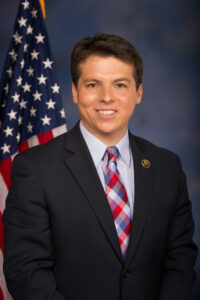
Brendan Boyle, Congressman for Pennsylvania, USA
An issue being discussed in the US is its next election and John Harris, Co-founder, Politico, USA guided the speakers to discuss if America will survive its next election. Brendan Boyle, Congressman for Pennsylvania, USA worries about US and other western nations who face electoral insurrections. We must not permit election officials to be replaced by partisans to overthrow correctly derived results. Analyses have show across the last US election there were few errors in the voting machines or in the processes of garnering the votes. But post-election one could declare the votes voided if one had enough illegal political will. Sadly, media have changed relatively recently and have become powerful/digital/global –permitting personal choice inclined towards own-bias. And culture has changed in so far as there is a market for silly conversations presented by some leaders who are chasing ratings. Everyone needs to be more diligent. Zach Conine, Nevada State jTreasurer, USA concurs we need critical thinking – taught early in schools. So that policies could be discussed politically, not via character annihilation. There is a line to be drawn between factually correct vs ‘don’t like it’ opinions. He agrees too that ‘bad actors’ should not influence the election outcomes; nor allow state to state variation within federal laws/changes. Jim Himes, Congressman for Connecticut, USA was sked to consider hoe stances are changing. He says they are as experienced this when he was in the Chamber on 6th January when there was violence. We must think about the information environment; the difficulties or ease of assessing voting entailment; and the most concerning is the ambiguity in how people can elect the new President. We must clarify all the mechanics of this process. Curiously, given there is a written constitution all the processes are not codified – and the development of voting technologies have simply confused the matter further.
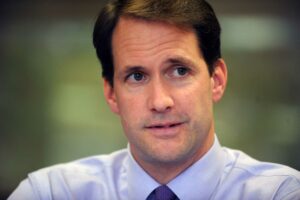
Jim Himes, Congressman for Connecticut, USA
On a topic that might have developed many conversations there were few takers for the Presidential Review. Perhaps it was too large a subject and too fast changing. Raja Krishnamoorthi, Congressman for Illinois, USA suggested congressmen must work alongside business leaders to invest in US industries. It ought not to be apolitical tirade but a cooperative venture – to address the teaching skills set for instance. We don’t need everyone to have a Phd for every job – there is a fitness for purpose. But the US must carefully tech the STEM subjects (science, technology, engineering and mathematics) and not ignore social skills and critical thinking. Victoria Coleman, Chief Scientist, United States Air Force, USA said partnerships are vital to co-develop over many science sectors. They have to understand their reliance on supply chain needs and acknowledge the lack of some electronics. And beyond the US (on land) – the Space Force – is developing security and the economy within commercial space programs.
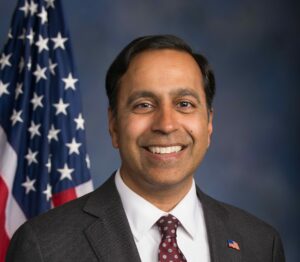
Raja Krishnamoorthi, Congressman for Illinois, USA
Meanwhile this meeting comprising many business leaders it seemed natural to discuss how to advance America’s competitiveness. Deborah L. Wince-Smith, President and Chief Executive Officer, Council on Competitiveness, USA lead the discissions, calling first on the Big Science viewpoint from Kimberly Budil, Director, Lawrence Livermore National Laboratory, USA. She said there were several lines that are important. Leadership in advancing the development and use of AI; advanced manufacturing solutions and developing nimble supply chains; clearly the bio-sciences need development. Beyond these the slow response time of science is a threat in the adaptation to climate. Hopefully nuclear fusion will supply a solution as demonstrated positively within the Laboratory recently – by the way, fusion was invented 60 years ago by a guy who still with the Lab. She agreed with Raja Krishnamoorthi that we must have lots of second level teaching, not for doctorates, even for gofors but machinists – the skills trades. Greg Hill, President, Hess Corp., USA is sure the US must access affordable independent energy, securely. And we must educate all consumers honestly on the realities of energy transitions. He too emphasised STEM as the #1 aim, without forgetting the social skills. And enable us all to pull together – academia, politicians and business. Nolan Pike, Chief Executive Officer, Electrolux North America, USA opined firms must be based on common interfaces and platforms to react easily and quickly to change. But it is hard to find able staff – and they have had to set up training colleges. Must change to be purpose driven firms – making things right first, and to retain staff.
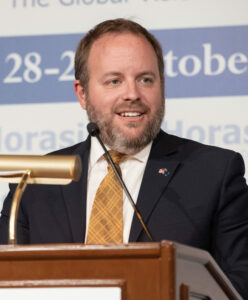
Zach Conine, Nevada State Treasurer, USA
There was an interesting exchange of views on Faith and Media in modern society. For instance, David W. Miller, Director, Faith & Work Initiative, Princeton University, USA saw these as issues from boardrooms to ballpens: corporate space does not have a lot in common with religion. There are underserved communities wherein faith and the media could address many issues if they came together. But negatives are most often represented – as news, by the media. Nicole Bibbins Sedaca, Executive Vice President, Freedom House, USA said there is a deep appreciation of free media globally, but less appreciation about religious media. The difficulty is that people are frightened about not having space to discuss, and about being negated, said to be woke – but we all seem to demand that our space is protected, just for me. Engaging with fake news does not mean it is an endorsement only that we are discussing different views. The media should present fakes as well as opinions – if they become merged the reader becomes confused. Aaron Sherinian, Senior Vice President, Deseret Management Corporation, USA agreed – commercial media, once trusted, is not now: our democracy becomes fragile due to less open discussion. This panel was chaired by Ed O’Keefe, Senior White House and Political Correspondent, CBS News, USA. said part of his work was to explain to his audience, and that skill was reflected in his panel management.
COVID management, or rather applying the lessons learned to the next pandemic was often noted. Jon Cohen, Staff Writer, Science, USA was chair of this panel and noted from the outset that the discussants might have to be restrained from being scientifically obscure. The COVID virus was first noted in late 2019 in China and then spread rapidly across the world: with several variants emerging in late 2020, amongst them the highly virulent Omicron form. Globally there have been over 400 million cases, and nearly six million deaths. Its incidence is not strongly correlated with a national population with the USA having 240,000 cases per million population – slightly less than the UK and far less than the Netherlands. The original COVID and its variants seem to target different age groups and Peter Marks, Director, Center for Biologics Evaluation and Research, FDA, USA noted “Operation Warp-speed had a budget of $12m – from the start the scientists were confident of having a vaccine but this was not a certainty in a short time-frame”. Patrick Soon-Shiong, Executive Chairman, Nantworks, USA said “We must invent a generic COVID vaccine… this is still a difficult concept as there are so many variants of COVID structures.” A troubling aspect remains across the world as many individuals remain, by personal choice, unvaccinated: some have genuine reasons and beliefs, but others are distracted by false assertions – they provide a fertile ground for mutation of the virus.
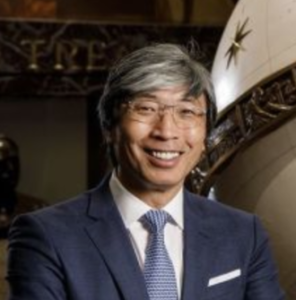
Patrick Soon-Shiong, Executive Chairman, Nantworks, USA
When discussing the global role of the USA Axel Threlfall, Editor-at-Large, Reuters, United Kingdom chairing the panel noted the increasing authoritarianism of Russa and China, Germany’s new found assertiveness, of course, Ukraine’s invasion; and across Asia the general rebalancing due to CCPTPP. Lisa Edwards, President and Chief Operating Officer, Diligent Corporation, USA pondered upon the present role of the US and its many crises that bring people to question its moral grasp. And thus, across the world, will it build bridges or walls? Kris Gopalakrishnan, Chairman, Axilor Ventures, India echoed this noting the US planks of development and of diplomacy are not proposed and enacted equally by the US – it seems that profits are the main motivator of the US. In part as the transportation of the Western/US form of democracy is not fitted to all other nations, desoute the Americans thinking it applies. Vinod Sekhar, Chairman and Group Chief Executive Officer, Petra Group, Malaysia thought that much of the loss of confidence in the US began with its pull-out from Afghanistan – yet that was initiated by former President Trump, only enacted by President Biden: he ought not to take all the blame – except that ‘the buck stops there’.
COVID decimated all global supply chains, and they are only now beginning to recover. Nik Gowing, Founder and Director, Thinking the Unthinkable, United Kingdom asked Bo Inge Andersson, Chief Executive Officer, Uzauto Motors, Uzbekistan several questions concerning the sales and assembly of cars. Bo Andersson said “he has the support of the Uzbekistan government to assemble Chevrolet vehicles – but with parts sourced across the world.” This is typical of most vehicle assemblers – but the globe’s situation is abnormal. There is COVID and the electronics embargo to consider, and now the realities of sanctions of Ukraine’s war, and the sanctions on Russian related subcontractors.
COVID and supply chains were discussed in a panel on the US and the Global Economy, chaired by Gerard Baker, Editor at Large, Wall Street Journal, USA, saying “the Ukraine is a catastrophe with serious economic global implications, mostly yet unforeseen.” Andreas Fibig, Chairman and CEO, International Flavors & Fragrances (IFF), USA said “COVID and staffing issues have run down stock so there is no inventory building at present, and the labor shortage demands robotization but that in turn raises labor unrest.” Hank McKinnell, Former Chairman, Moody’s, USA coupled these thoughts with inflations “since Ukraine is the bread basket of Europe, and Russia is a massive fertilizer suppler.” He said the economy will not face the inflation well and though COVID raised many issues and we learned solutions, especially about labor “25% were more productive, 50% were doing the same & 25% could be removed.” Marco Antonio Del Prete, Minister of Sustainable Development, State of Queretaro, Mexico hopes “ the tragedy of Ukraine does not last long.” Jane Wurwand, Founder, Dermalogica, USA said immigration to the US must be addressed. Most immigrants are hard-working and many have skills.
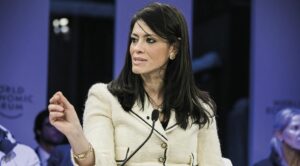
Rania A. Al-Mashat, Minister of International Cooperation, Egypt
Across many panels the effects of climate change were mentioned and specifically on this point Rania A. Al-Mashat, Minister of International Cooperation, Egypt noted the Ukraine invasion has eclipsed the presentation of the most recent IPCC Report on Climate Change. This is a long document noting how the globe is adapting, and counteracting climate change, and the general claim that projects in developing nations are too risky to uptake: there will be no profit, so are not a commercial risk. Mary Robinson, former President of Ireland and Chair of The Elders, Ireland asks that businesses work with the Multi-lateral Development Bank to de-risk investment. Thus, new projects become un-risked as the development bank can garner other investors and the project firm has a chance of becoming profitable. Tom Steyer, Founder of NextGen America, USA further stressed the importance of the clean
energy and clean infrastructure, citing President Biden’s infrastructure plan. David de Rothschild, Founder, Voice for Nature, United Kingdom Agreed IPCC report is vital reading – as it may offer clues to avoid short-termism (politics) and support the long-term (business strategies). As illustrated by the Ukraine conflict – why are we not putting sanctions on big polluters? The inspiring panel was chaired by Sally Ann Ranney, Co-Founder, Global Choices, USA
Frequently across the meeting climate change was mentioned. In a specific panel on the subject chaired by Laura Dawson, Principal Program Manager (Global), Amazon Web Services Institute, USA she discussed with Tanushree Biswas, Spatial Data Scientist, The Nature Conservancy, USA and Rachel O’Leary, Executive Director, City Plants, USA who both were researching on the use of trees. Tanushree Biswas, says “the more trees the lower the ambient temperature. Over Californian coastal cities there is space for 34 million trees. They will reduce temperatures sufficient to avert 4,000 premature deaths over 10 years.” And Rachel O’Leary, notes “house zoning regulations results in uneven tree cover: poorer sectors of cities have fewer trees.” Analytics are being used to find areas to plant trees to substitute concrete for a tree. Research finds trees are a power-house providing several levels of health recovery. They also sequester CO2 and support more biodiversity. Importantly they modify extreme heat events – but there are no answer yet – it needs City policy interventions to make tree space.
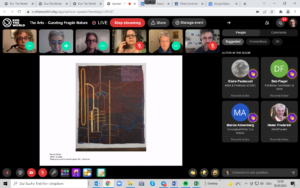
The Arts – Curating Fragile Nature
Edward Mermelstein, Commissioner on Foreign Affairs, New York City, USA discussing the deployment of digital assets as a mode to develop social welfare noted how New York’s deployment of technology (Internet, etc) to all household is the first step in balancing equity and the economy with social issues. COVID has taught people to be flexible, and being digital allows New York to query good ideas globally and to offer advice, if asked, globally. The plan is to enable all the people at the same time. Anton Schmidbauer, Chairman, Assetera, Switzerland gave a more detailed insight about digital assets. The present economy means our money is in the banks, but next generation of services will give direct/direct exchange as a decentralized service. Of course, regulation is needed and they are gradually evolving at government level, added session chair Steven V. Melnik, Founder, PoliticalAndBusinessDiplomacy.org, USA
The US and India partnering post-Covid was an interesting panel. Chaired by Sunil Kant Munjal, Chairman, Hero Corporate Services, India who said “for too long the US and India have talked at 30,000 feet, not on nitty gritty detail. Despite this, India and US pharma did a great job on COVID.” Sentiments echoed by Suresh Prabhu, 6 times Member of Parliament and former Cabinet Minister, India who said “India and US step on each other’s throats as minor short-term irritants rise up especially on climate accommodation, energy and so on. We must look to long visions. Nor let Commerce Departments discuss – as climate change is not immediately about financial policies but a long-term philosophy.” Harry G. Broadman, Managing Director, Berkeley Research Group, USA said “he is disappointed that the Biden administration is too like the Trump one – not developing Indian links – so he suggests India takes an initiative in the forthcoming times when India take the chair of the G20.” R Mukundan, Managing Director, Tata Chemicals, India thought one area of cooperation could be on the transition to net-zero especially on nuclear energy, and on green hydrogen “… its commercialization needs to take off.”
And still concerning India/US accords, we must consider sustainable capitalism. Doug Wilks, Executive Editor, Deseret News, USA led a discussion on this topic asking if we can promote inclusivity – asking initially Munir Akram, Chairman, Group of 77, United Nations who said “Covid exposed inequities leading to supply chain disruptions.” And also we need to resolve debt problems and wake up private sectors. There is still lots of cash in the IMF- about $650 billion – that could be dispersed to the Multinational Development Banks who needs to be refinanced as they can garner more cash later after they offer seed-corn financing on projects that are deemed commercially too risky and having too low a potential profit. “The sustainability gap is an investable problem and mainly now in poorer nations” opined Xavier Michon, Deputy Executive Secretary, United Nations Capital Development Fund, further stating “ the United Nations noted too many clients were asking for exclusivity – they ask for a return on ‘my’ investments.” And Barbara Prey, Artist and Member, National Council on the Arts, USA stated firmly all artists are creative risk takers and have to be entrepreneurs. They too need cash, but they are aware of trends and can express them to a new audience. She thinks “the largest corporations will take a leading role in sustainability.”
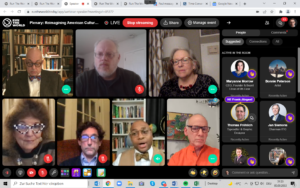
Reimagining American Cultural Diplomacy in War & Pandemic
The Asia-Pacific region is looking to boost sustainability through the development of the CPTPP accord (Comprehensive and Progressive Agreement for Trans-Pacific Partnership) discussed in a panel chaired by Vikram Khanna, Associate Editor, The Straits Times, Singapore who noted “the AII bank has cut/blocked their investments in Russia and is conscious that the cost of fuels and food in developing world will be affected negatively.” Erik Berglof, Chief Economist, Asia Infrastructure Investment Bank, China who reviews the value and supply chains in Asia, noted the emerging world of Asia have taken more of the supply and value chains instead of EU/US. And – according to Marjorie Yang, Chairwomen, Esquel, Hong Kong – China has taken more of a leadership role but “China needs to improve its standards of manufacturing and this may be slow or impossible in order to enter the CPTPP – though it did change to alter to enter WTO.” Taro Kono, Former Minister for Administrative Reform and Regulatory Reform, Japan agrees, and has “strongly called for US to rejoin CPTPP, with other in the region.” Both Erik and Taro were angry about the Russian invasion of Ukraine, and this was supported by Sandiaga Salahuddin Uno, Minister of Tourism and Creative Economy, Indonesia who worried that “sanctions and fuel costs will impact value chains – especially on the 35m jobs in Indonesia. And also, Russian and Ukrainian tourists were important here (and across the region) as they often stayed a long time.”
An interesting panel on Reimagining American Cultural Diplomacy in War & Pandemic, Jonathan Hollander, Founder, Battery Dance, USA said he was startled by artists having to drop all work connected to Russia. “Art is not frivolous; it is a salary source needed for living” and from his view as a choreographer, said we can’t dance with each other unless we trust the other. Live performances stopped in the pandemic – but Battery Dance invented a digital program for the world. Ultimately, “engaging in cultural exchanges also exports/imports culture to enhance local hosts’ lives and bridges are built, walls torn down.”

Zoë Baird, Chief Executive Officer and President, Markle Foundation, USA
And then discussing America’s resolve in moving forward, chairperson Akiko Fujita, Anchor and Reporter, Yahoo Finance, USA asked her panelists what they thought was driving America. Zoë Baird, Chief Executive Officer and President, Markle Foundation, USA said “it became clear was how inter-dependent, we all were before, during and now post-COVID.” In the US they have found 77% do not have a college degree… the big question is “how to change this in a digital world to find how to express ‘uneducated’ persons’ innate skills?” – a problem noted earlier by Peter Marks. She runs training programmes for firms to avoid over-specifying jobs, so permit non-degree candidates to apply via lightly-filled-in application forms that create resume for job applications. This eases skill-based hiring. Deborah L. Wince-Smith, President and Chief Executive Officer, Council on Competitiveness, USA noted the US was in accord with Zoë Baird she noting “that US leadership depends on its strength domestically. And this is similar to the problems in Ukraine, and also China.” S. Ramadorai, Chairman, Tata Institute of Social Sciences, India said “during COVID the Global Alliance of vaccinations anti-covid was a great decision – later there will be circulating endemics and similar accords will be needed.” The innovation eco-system has global growth implications and have to be well thought-out – from energy supply to tech-developments. Presently the shortage of chips is creating an instant crisis and maybe creating poor knee-jerk decisions.
In general, the President’s popularity reduction is a typical effect in midterms, but within the complex US and global affairs it is difficult to see how President Biden will wield a magic wand. The US President says to be stronger the US must be more equal – it is good that the US has outstanding labor Unions that do training – which is positive. Firms also support training. But too few parents wish their kids to work in a manufacture plant which was not the case in the German Mittelstand. New growth engines have to be found – through innovators, increasing in the US by 10x. These have to be built across US, not just in hightech clusters. However, there may be a danger of anti-trust laws acting against firms that develop using distributive thought innovation and physical development which are alleged to be too large and powerful.
Horasis and TCS announced at the meeting a collaborative effort to develop a trusted space for interaction with other members. This project was introduced by Girish Ramachandran, President Asia Pacific, TCS, Singapore who said, together with Horasis members, TCS will offer a peer-to-peer platform for knowledge creation developed jointly by Horasis members to find a better and more sustainable collaborative future for all.
The next Horasis Meeting will be held on May 19th – the Horasis Global Meeting – you are invited to participate and to speak on the various panels. The summits’ title is Toward a New Era of Peace and Sustainability. The programme is a moving target as you can imagine, we don’t know how Ukraine – and the world – will look like at that time. We hope that Ukraine will be a free country soon again.




